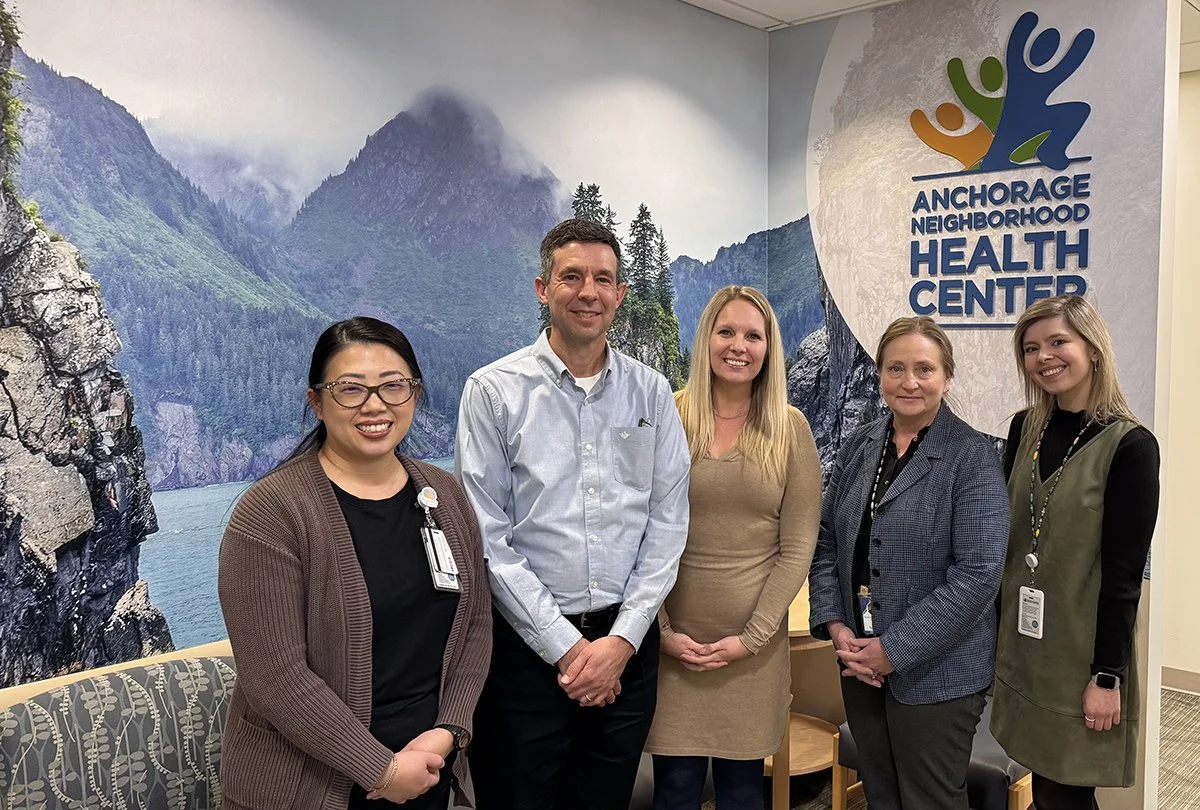Advancing Integrated Behavioral Health: ANHC Welcomes Tri-Cities Community Health for a Learning Visit
Pictured, from left: ANHC Behavioral Health Manager By Thao, Scott Michael and Kristy Leitze of Tri-Cities Community Health; ANHC Chief Health Integration Officer Dr. Sarah Dewane, and BHC II Dr. Robyn Davis.
On Tuesday, November 18, 2025, Anchorage Neighborhood Health Center had the pleasure of welcoming colleagues from Tri-Cities Community Health (TCCH)—a large, multisite Federally Qualified Health Center (FQHC) serving the communities of Kennewick, Pasco, and Richland, Washington. Their team traveled to Anchorage after attending our presentation at the Northwest Regional Primary Care Association (NWRPCA) conference in May, where we shared an overview of ANHC’s integrated behavioral health model.
This visit provided an opportunity for two community health centers—each serving diverse populations with complex needs—to learn from one another and strengthen the future of whole-person care.
Why They Visited: A Shared Commitment to Integrated Care
At the NWRPCA conference, TCCH expressed interest in seeing how ANHC operationalizes behavioral health integration within a primary care setting. Their questions reflected the same challenges many health centers across the country are navigating:
How do you make behavioral health accessible at the exact moment a patient needs support?
What workflows help medical and behavioral health teams communicate seamlessly?
How do you structure visits, scheduling, and warm handoffs in a busy clinic environment?
How do you balance brief interventions with longer-term therapy needs?
And importantly—how do you do all this sustainably within an FQHC?
Their visit allowed us to explore these topics in real time with our clinical and behavioral health teams.
Inside ANHC's Integrated Behavioral Health Model
During their time on site, TCCH explored several components of ANHC's model, including:
Warm Handoffs and Rove Consultations
Our “rove” system allows a Behavioral Health Consultant (BHC) to remain available for immediate consultation when a medical provider identifies a behavioral health need. Rove visits typically last about 20 minutes and focus on:
Screening, Brief Intervention, and Referral to Treatment (SBIRT)
Safety assessments
Coping strategies
Health behavior change
Connection to ongoing care
Continuum of Brief and Ongoing Therapy
ANHC offers several levels of support based on patient need, including:
Single-visit consultations
Up to four sessions of brief targeted therapy
Longer-term therapy (typically up to 12 sessions) for complex conditions
Integration With Medical Care
Behavioral health services at ANHC are intentionally embedded into primary care. Our BHCs, Psychiatric NPs, patient navigators, medical providers, nurses, and clinic staff work closely through:
A shared electronic medical record (EMR)
Real-time communication through Microsoft Teams
Collaborative care planning
Interdisciplinary meetings
A unified informed consent process for integrated care
A Generalist, Trauma-Informed Approach
Our BHCs use a range of evidence-based modalities, including:
Cognitive Behavioral Therapy (CBT)
Dialectical Behavior Therapy (DBT)
Motivational Interviewing (MI)
Mindfulness and relaxation techniques
Solution-focused approaches
Brief interventions tailored to immediate patient needs
Shared Challenges and Shared Learning
Both ANHC and TCCH recognize the realities facing behavioral health today: increasing patient complexity, limited community mental health capacity, and growing demand for integrated services. The visit created space for candid conversations about:
Scheduling and access challenges
Managing no-shows
Bridging patients to specialty mental health care
Supporting workforce development and continuing education
Crisis response in a primary care setting
Improving coordination across care teams
These conversations reinforced a simple truth: integrated behavioral health is essential—and works best when health centers share ideas and learn from one another.
Why These Connections MatteR
At the heart of community health center work is a commitment to:
Collaboration
Shared learning
Innovation rooted in real patient experience
Accessible, whole-person care
Thank You to TCCH
We are grateful that TCCH took the time to visit our facility, meet our team, and engage in thoughtful dialogue about integrated behavioral health care. Their curiosity, openness, and partnership made the experience incredibly valuable.
We look forward to continued connection and shared learning as we work collectively to deliver compassionate, high-quality care for the patients and families who depend on us.

